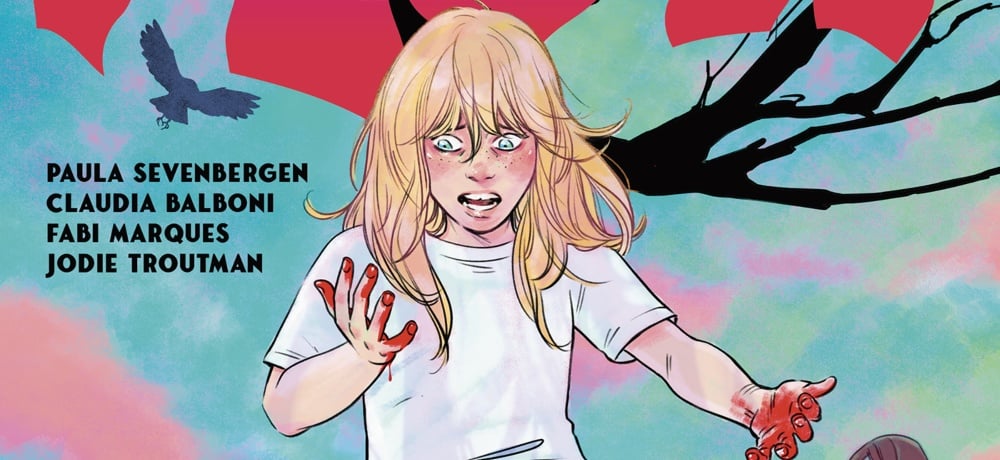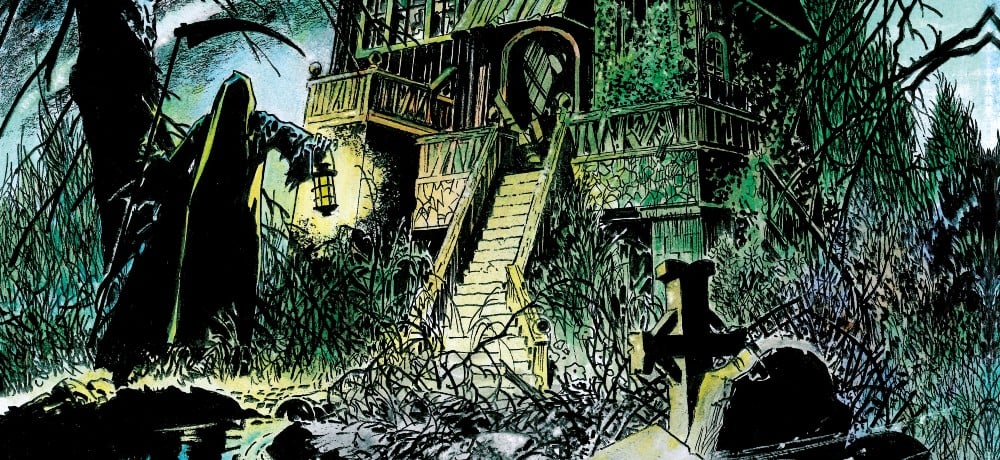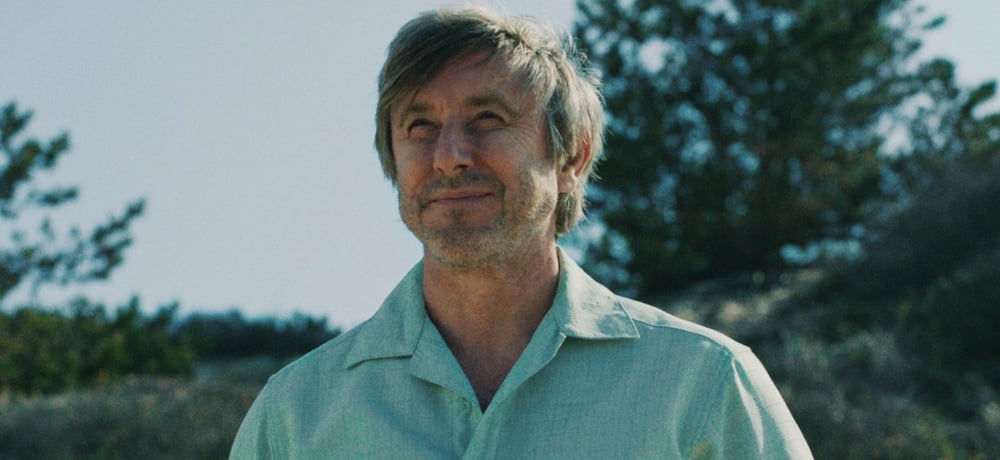






When I think of my favorite casts in a movie, Zack Snyder's Dawn of the Dead invariably comes to mind, as I love watching the interactions between Sarah Polley, Ving Rhames, Ty Burrell, Michael Kelly, Mekhi Phifer, and Jake Weber as much as I enjoy the fast zombie action (I'm firmly in the camp that enjoys both George A. Romero's lumbering flesh eaters and Snyder's frenetic living dead sprinters). I was especially thrilled, then, to speak with Weber about his enigmatic role in the new mind-bending sci-fi horror film The Beach House, which follows two very different couples in the midst of an otherworldly ecological transformation on the secluded seashore.
During our in-depth chat, Weber talked about what drew him to the character of Mitch in The Beach House, and he also discussed the movie's quiet sense of dread, working with first-time feature director Jeffrey A. Brown, collaborating with fellow cast members Liana Liberato, Noah Le Gros, and Maryann Nagel, what it was like filming his character's shocking long shot scene, and he also reflected on what makes the ending of Dawn of the Dead (2004) so effective more than 15 years after its release.
You can check out the full interview below, and in case you missed it, be sure to read Heather Wixson's interview with writer/director Jeffrey A. Brown for more insights into the making of The Beach House, which is now on Blu-ray, DVD, Digital HD, and VOD from RLJE Films following its release on Shudder over the summer.
Congratulations on The Beach House, Jake. I just had the chance to check it out for the first time last night, and man, that movie really sticks with you. I had some weird dreams after that one.
Jake Weber: I just think the ending is inspired. It's just heartrending and so spooky. It's hard to end a movie, and he [Jeffrey A. Brown] really put an exclamation mark on his movie.
It's so unpredictable and it plays with certain genres. Just out of curiosity, how did this film initially come to your attention?
Jake Weber: Andrew Corkin, with whom I'm friendly, was the producer on the movie. He approached me and I read the script and I thought the script was interesting. And I had the time, it's only eight days out of my life, and I liked Andrew and said, "Sure, man. I'll do it." We talked through a lot and the director did not disappoint. He's a very stylish director—great with atmosphere, very efficient with his day. We had a terrific DP [Owen Levelle] and I think that the movie worked. A fantastic leading lady, too, I thought she was just terrific.
Yeah. I love the cast in this. It almost feels like this could be a stage play, even though it's about this massive apocalyptic event. It's such an intimate story about relationships and generational differences in some ways. Did you guys have a lot of time to rehearse together, or were you just thrown into this and went from there?
Jake Weber: No, very rarely is there time to rehearse. You basically get thrown into it. They give you two paper grocery bags and you walk in and you pretend that you know your wife and you have a backstory. And you just wing it.
The chemistry is so interesting with these characters because it feels like we're seeing how your character and Jane see the world, and then how Noah and Leanna's characters see the world. It feels like they're so open to the vastness of information and technology, and it feels like your characters relish the smaller things in life and each other. Was it interesting for you to dive into that generational dynamic?
Jake Weber: I think that it was just a preexisting, given circumstance that was just there. What was most interesting to me was, from the perspective of the couple of which I was a part, they were lonely and sad and towards the end of their journeys. And here was this young, vital couple that were also having emotional difficulties and were facing their own set of challenges on a human level. And I think that's what made the film work. And because the director spent enough time on these poor people without necessarily being overt about it, there was just enough there to make an audience invested in them as people.
And then once you care about these people, this whole eco-apocalypse happens and that's all she wrote. And I think it's a cool metaphor for life. Sometimes you struggle through life and there are problems and then it's over. And there's joy and there's moments of grace and kindness and humanity and community. And then it's gone. I think it's an interesting movie in that respect. But of course, it's also a terrifying story about eco change. And also, it's just a fun horror movie, a quiet horror movie. A lot of the best horror movies are not that loud.
Yeah. This one really gets under your skin literally and figuratively. And I feel like it really benefited, like you mentioned, getting to hang out with these characters and watch them have dinner together and eat the edibles together. And you get a sense of who they are before all this stuff happens.
Jake Weber: Yeah. There's a quiet sense of dread. There's a lot of quiet moments in the movie and that is offset very well with all the fear and panic later on, the calm before the storm. Before a tsunami, the ocean is deadly calm, and I think that's an interesting thing to play with in a movie.
I almost can't believe this, but this was Jeffrey's first feature film, and he has such a command of the filmography. It doesn't feel necessarily like a first-time feature for him. What was it like working with Jeffrey? Did he have a very specific vision for you to work with? Did he give you some creative freedom from all of your experiences coming into this?
Jake Weber: He immediately impressed me as being very confident and secure. He didn't yell at the crew, which is a sign of security. He wasn't impatient. He was a very calm presence on set, which is important for the actors to be calm. In terms of acting, I don't know how he was with the other actors, but I don't remember a lot of direction in terms of what he would like differently. But he knew what he wanted and like all good directors, he had to move quickly under the constraints of the budget and time. And he set up very dynamic camera shots, which I think helped hugely because we're limited to one location. And so you have to be very dynamic with your cameras to keep that interesting for an audience, so it doesn't feel static.
I think he did a pretty good job with that. I know that his DP was extremely agile. And I think considering how little money there was, the movie came across because of the camera crew and Jeffrey. And obviously, he had a solid script and he knew what he wanted.
Yeah, the way they filmed those interior scenes almost felt like a documentary or even The Office, where you feel like you're in that room with everybody. It doesn't feel as set up. It's more like you walked into the room and now you're observing everyone. It really immerses you into the movie.
Jake Weber: That's interesting, right. Yeah, very voyeuristic, a fly on the wall. I think that also gave a claustrophobic feel to the film, which you may not realize it as you're watching it. But tension is building because of the claustrophobia and the weirdness of the relationships. And everything's a little bit off, a little bit unsettling, and then all of a sudden the shit hits the fan.
[Spoiler Warning] I have to mention your last scene in the movie. I just think it's so powerful and it's so unexpected. It reminded me of the end of Kate Chopin's The Awakening, where that character just walks into the water. What was it like filming that scene, because it's just that one long take, that one long shot of you walking into the water. Did you really just keep walking until your head went under?
Jake Weber: Well, the sandbar was very close to the water. It didn't get deep and go very, very far in. And so I just kept walking and I thought it was going to be colder than it was, and the dunking under took my breath away a little bit, but I'm curious, why do you think he walked in there?
I was going to ask you the same thing. I think that's the beauty of it, though, is that it's so ambiguous. Part of me wants to think he knew he was infected and he just wanted to end it before it got any worse. Maybe he knew that his wife was infected and he didn't know what to do. Or maybe it wasn't even anything to do with the ecological aspect of it, because we had already seen how much of a toll her terminal illness had taken on him. There are so many different conclusions.
Jake Weber: Yeah, it's cool. It's definitely a poetic moment that's open to interpretation, so that's interesting. It's nice that it's not clearly defined.
I love a horror film that makes you think a little bit and also makes you use your imagination. This movie really plays with ambiguity well in so many different ways. There's a creature in the basement, and we get an idea of what might be going on there, but we have to fill in some gaps. And then there's your character, and there are so many different things where we have to make our own movie in a way, too, to complement what we see on screen. But I like that because I don't want everything spelled out for me, either. It's a little more up to the imagination.
Jake Weber: Yeah, I would tell you as an actor, my choice in that moment was that he just felt like a swim at that point. And there was some sense of him, he'd been saying goodbye to his wife for a long time. I can't remember in the film if he had seen her in the process of having her body snatched. But her body and her mind had been in the process of getting snatched for so long. I think he went for a swim and then when he was out there, he just said, "I think I'm going to..." I think it's a moment. So I think in my mind it didn't start off as a suicide, but somewhere along the way he said, "I think it's time."
But I don't know. Again, I don't want to define that for an audience. I'm just telling you what was going on in my mind, but I wouldn't want it more defined. I think it's nice that people can read into that. I'm curious what the director thought. I never discussed it with him.
I love that ending. It reminded me of your character's ending in Dawn of the Dead (2004) as well, which still is one of my all-time favorite horror films. Looking back on that moment of you on the dock, it has that same sadness to it, that same bittersweetness to it. It's been over 15 years now, but I think it really holds up well.
Jake Weber: It does. Yeah, I saw it for the second time. I saw it at the premiere and then I saw it recently with my son again. Zack Snyder had a screening of it as a benefit for his old film school. I saw it again and it really does hold up. I think it's Zack's best film myself, but that ending is terrific, isn't it? Because what's great about that ending, I think is yes, we are invested in that guy. And he's the last one that we want to [die], and obviously Sarah Polley. But I just love how Zack undercut the sentimentality of that with that raucous Jim Carroll punk rock song coming in right after.
With The Beach House now on Blu-ray, DVD, VOD, and Digital HD, are there any other projects coming up that you wanted to discuss, maybe another appearance from Zareh in Star Trek: Discovery coming up perhaps?
Jake Weber: Oh, no, I hate to break it to you, but he doesn't make it, but I've got a Taylor Sheridan movie coming out called Those Who Wish Me Dead, staring Angelina Jolie and a whole bunch of other terrific actors. And this is Taylor Sheridan, an extraordinarily gifted writer and filmmaker, and I have a very strong part in that. And then What Josiah Saw, that's a very, very interesting movie, and then I just did a film called Every Last One Of Them, is the last thing I just did. And I don't know what else. Sometimes I forget, and then the movie will come on and I'll say, "Hold on, wasn't I in that?"
Well, that's good. It means you're staying busy.
Jake Weber: Yeah, either that or I'm just too old to remember where I left my car keys and what movies I did.